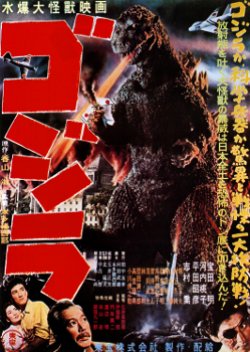
Both Godzilla (1954) and Shin Godzilla (2016) have much more realistic, dramatic storytelling elements to them than other entries into this franchise. They both carry commentary on the after-effects of radiation - Godzilla following ten years after the Second World War and being a metaphor for the H Bomb, and Shin Godzilla a result of the dumping of Nuclear waste in Tokyo Bay.
Both act as two of the strongest entries into the franchise to date, and contain many topics of discussion which will leave the viewer thinking long after they've watched these films.
Both act as two of the strongest entries into the franchise to date, and contain many topics of discussion which will leave the viewer thinking long after they've watched these films.


Godzilla (1954) is the movie which started it all, and Godzilla Minus One is a fantastic modern take on the kaiju's story.
Both films hold similarities with one another, acting as commentary for the events prior to the Second World War. Godzilla (1954) is a heavy critique on nuclear warfare and the atomic bombings of Hiroshima and Nakasagi, showing a very real picture of a post-war Japan trying to pull itself back up whilst still suffering the after-effects. Minus One also follows this message, showing a more in depth side of the daily life and struggle of the recovering country. Both Godzilla (1954) and Minus One show how the introduction of an overpowering, never before seen threat in the form of Godzilla proves yet another struggle for the civilians of Japan to rise up against, forcing them to band together to find a way to destroy him and save their country.
If you enjoyed the new Minus One movie and would like to see another, more serious take on the kaiju rather than the 'monster of the week' battle royale style later movies followed, then do yourselves a favour and check out the original. It still holds up strong even over seventy years later!
Both films hold similarities with one another, acting as commentary for the events prior to the Second World War. Godzilla (1954) is a heavy critique on nuclear warfare and the atomic bombings of Hiroshima and Nakasagi, showing a very real picture of a post-war Japan trying to pull itself back up whilst still suffering the after-effects. Minus One also follows this message, showing a more in depth side of the daily life and struggle of the recovering country. Both Godzilla (1954) and Minus One show how the introduction of an overpowering, never before seen threat in the form of Godzilla proves yet another struggle for the civilians of Japan to rise up against, forcing them to band together to find a way to destroy him and save their country.
If you enjoyed the new Minus One movie and would like to see another, more serious take on the kaiju rather than the 'monster of the week' battle royale style later movies followed, then do yourselves a favour and check out the original. It still holds up strong even over seventy years later!










![Kaiju,Tokusatsu,Mecha,etc* [Multi-List]](https://i.mydramalist.com/aEgymt.jpg)
![Kaiju,Tokusatsu,Mecha,etc* [Multi-List]](https://i.mydramalist.com/Zbd0q_4t.jpg)
![Kaiju,Tokusatsu,Mecha,etc* [Multi-List]](https://i.mydramalist.com/YAZ2gt.jpg)
![Kaiju,Tokusatsu,Mecha,etc* [Multi-List]](https://i.mydramalist.com/9xYJyt.jpg)
![Kaiju,Tokusatsu,Mecha,etc* [Multi-List]](https://i.mydramalist.com/xbjEr_4t.jpg)




















